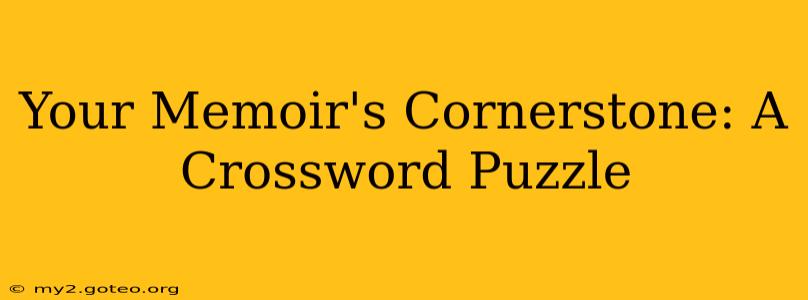Writing a memoir can feel like staring at a blank page, a daunting expanse of untold stories. But what if we approached it differently? What if, instead of facing a vast, intimidating landscape, we saw it as a challenging, yet rewarding, crossword puzzle? Each clue, a memory; each answer, a piece of your life’s intricate tapestry. This approach can unlock your life story in a surprisingly engaging and structured way.
This article will explore how using a crossword puzzle framework can help you organize and enrich your memoir writing process, transforming a seemingly overwhelming task into a manageable and even enjoyable one. We’ll delve into the practical application of this unique method and address some common questions you might have.
Why Use a Crossword Puzzle Approach?
The beauty of using a crossword puzzle metaphor lies in its inherent structure. A crossword provides a framework, forcing you to consider connections and intersections between different aspects of your life. It encourages you to think both broadly and deeply, excavating memories you might not have otherwise considered relevant.
Think of the different sections of your life – childhood, education, relationships, career, significant events – as different sections of the crossword grid. Each clue, representing a specific memory or experience, will intersect with others, revealing unexpected connections and revealing a richer, more nuanced narrative.
How to Create Your Memoir Crossword Puzzle
-
Choose Your Grid Size: Begin by deciding on the scope of your memoir. A smaller grid might focus on a specific period of your life, while a larger grid could encompass your entire life story. Don't feel pressured to create a massive crossword; start small and you can always expand later.
-
Identify Key Themes and Events: Brainstorm significant events, relationships, and themes that have shaped your life. These will form the basis of your crossword clues. Think about pivotal moments, turning points, and recurring patterns.
-
Develop Your Clues: Each clue should be a memory or experience related to your life. These clues can be straightforward or more metaphorical. For example: "My first pet's name" (simple clue), or "The place where I discovered my passion for writing" (more complex clue).
-
Interconnect Your Clues: As you develop your clues, consider how they relate to each other. Some clues might overlap, creating connections between different aspects of your life. This interconnectedness enhances the narrative's depth and coherence.
-
Fill in the Answers: Once you have a selection of clues, start filling in the answers – these are the details of your memories. Describe the events, feelings, and reflections associated with each memory.
-
Refine and Expand: Review your crossword and make adjustments as needed. You can add new clues, modify existing ones, and expand on your answers to create a more complete and engaging narrative.
What if I Don't Remember Much?
This is a common concern. The crossword puzzle approach doesn't require perfect recall. It's more about sparking memories and using those sparks to build your story. Use photographs, journals, and conversations with loved ones to jog your memory and fill in gaps. Embrace the imperfections and uncertainties; they are part of your unique story.
How Can I Make it Engaging for Readers?
Remember, you're not just writing a chronicle of events; you're crafting a story. Use vivid language, sensory details, and emotional honesty to bring your memories to life for your readers. Focus on showing, not telling. Instead of simply stating "I was sad," describe the physical sensations, thoughts, and actions that accompanied your sadness. Consider the overall arc of your story, creating a beginning, middle, and end that will captivate your readers.
Is this method suitable for all types of memoirs?
While this method works well for many, it might not suit every memoir. Highly chronological memoirs might find it less suitable. However, even chronological memoirs could benefit from using this approach to explore specific thematic sections within the overall narrative. The crossword puzzle methodology is best suited to memoirs that benefit from a more thematic or interconnected narrative structure.
Using the crossword puzzle approach to memoir writing offers a unique and engaging way to organize your thoughts and memories. It’s a structured yet flexible framework that empowers you to uncover and share your life story in a compelling and meaningful way. So, grab your metaphorical pencil, and start filling in the blanks of your personal crossword puzzle – your life story awaits!

